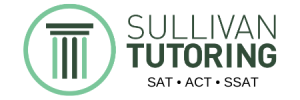By Scott Sullivan
President and Founder, Sullivan Tutoring
and Becky Squibb
Director of English, Sullivan Tutoring
Junior year of high school is one of the busiest years. With more difficult classes, extracurriculars, and the onset of the college application process, it’s easy to become overwhelmed. Take a deep breath. Here’s your fall guide to Junior year:
Action 1: Register for the SAT/ACT.
You should start to schedule these tests now so that you have ample time to prepare for them. Each student is different, so a “testing schedule” is not one-size-fits-all. We typically recommend taking the SATs twice (perhaps in January and May) and the ACTs once (possibly in February or April) before your Senior year. It’s best to take the tests when you aren’t as busy with sports or clubs, so check out your schedule before you register.
Not sure if you should take the SAT, ACT, or both? We typically give our students full-length, timed practice tests for both the SAT and ACT. Once we score those tests, we are able to make a well-informed recommendation. Again, every student is different so it is important to individualize testing schedule.
Action 2: Work on your resume.
The experts at College Quest Advising, Renée Serrano and Dr. Mary Baker, explain, “…A resume is a summary of your past and present experiences. It gives an overview of who you are, your unique interests and talents and how you have developed them. Therefore, creating a resume that will adequately represent you during the college application process would be immensely helpful.” They also suggest brainstorming with your parents to help you remember your activities and commitments to list on your resume. “When it comes time to complete college applications, the earlier activities you participated in may have escaped your memory.” Because of this, it is important to “[keep] track of your activities throughout your high school years and [update] them (leadership positions, activity accomplishments, etc.), as you go along…”
By working on your resume now, you can avoid stress later and you are less apt to forget important details. Serrano and Baker encourage you to “represent yourself in the best way possible by creating a resume that highlights your interests, talents, activities, and experience. It will be a great addition to your college application process, and you will be happy you put the time into creating it sooner than later. Create options for your future by taking the time to think about who you are, what you have to offer and putting those thoughts into action.”
Check out the full post by College Quest Advising by clicking here. Or visit: https://sullivantutoring.com/2016/10/college-quest-advising-resume-advice-from-the-experts/
Action 3: Visit colleges (unofficially).
Scheduling guided tours of colleges is important. BUT you should also try to visit schools and take a self-guided tour to explore the campus on your own. This means going to the school, walking around, eating in the cafeteria, checking out the bookstore, etc. without a person from the admissions office giving you the tour. By going to the school and seeing it without someone sugar-coating every detail, you are able to establish your own sense of the campus. While you’re there, keep track of the things you like and dislike. This way, you will have a better idea of what you’re looking for when you do go on those guided tours.
Getting started is the hardest part, but take action this fall and you’ll be much more prepared for next year!

